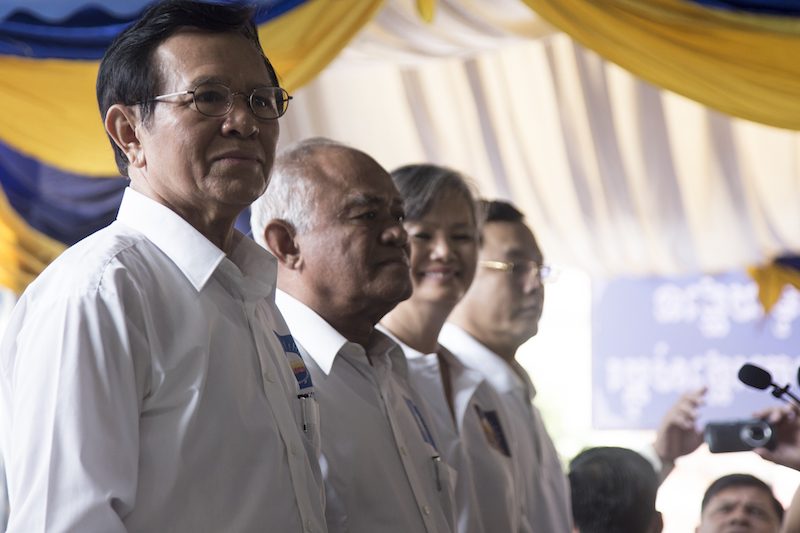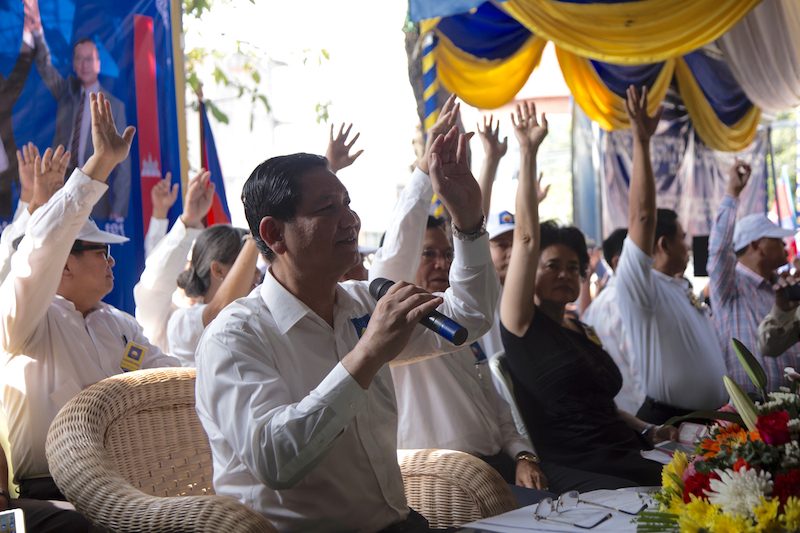Opposition leader Kem Sokha, speaking after officially becoming the CNRP’s president at a party congress in Phnom Penh on Thursday, laid out a five-point strategy as campaigning ramps up ahead of commune elections set to take place in June.
After being approved, along with three new vice presidents, by hundreds of party officials from across the country in a theatrical vote—deemed unanimous despite some in the crowd failing to raise their hands when prompted—Mr. Sokha laid out his vision for success at the local polls.

“We know very well that the road to victory and nonviolent change that lies ahead of us will be filled with obstacles,” Mr. Sokha told a raucous audience at the party’s headquarters.
“From now on, the CNRP will always look and step forward. Regardless of the big storms ahead of us, the CNRP will not turn around. We will not hesitate or shift from our party principles.”
The ruling party has said in the past week that the word “change” is itself a threat to national stability, with Prime Minister Hun Sen warning that a vote for change could plunge Cambodia back into civil war, while Defense Minister Tea Banh said the word should be prevented along with other perceived symbols of revolution.
Unlike his predecessor Sam Rainsy, who resigned last month, Mr. Sokha has studiously steered clear of direct attacks on the ruling party, but removing Mr. Hun Sen and his officials from power—starting with commune chiefs—was very much at the center of his speech on Thursday.
“Change commune chiefs who serve the party and replace them with commune chiefs who serve the people” would be the overarching theme of the party’s commune election campaigning, he said.
Mr. Sokha instructed officials to focus on five pledges, threatening to punish any CNRP commune chief who did not follow through on them. He said the party would allow people to create communities to manage their own forests or agricultural land, have commune leaders meet with local residents before making any major decisions, provide public services without taking any bribes, and ensure security by combating drugs and violence.
The fifth promise was to drastically boost commune-level funding if the party wins next year’s national election, setting aside about a fifth of the national budget in order to give $500,000 to each of the country’s 1,633 communes. That would cost more than $816 million, which is equal to about 16 percent of this year’s total budget of $5 billion.

Commune budget allocation currently ranges from $10,000 to $20,000 depending on the size of a commune—an official from one commune interviewed last year said its budget had been cut from $17,500 in 2013 to about $13,000 in 2015. Though the government has long pledged to undertake reforms to decentralize power, little progress has been made.
The situation was explored in a research paper released last year by Netra Eng, head of the government unit at the Cambodia Development Resource Institute, and Sophal Ear, an associate professor of diplomacy and world affairs at Occidental College in Los Angeles.
“The CPP wants to improve service delivery and we’ve seen selective efforts in that direction after the 2013 election, i.e. the education sector reform,” Ms. Eng wrote in an email summarizing their findings.
“But remember that to seriously improve services, the CPP needs to give sufficient power over decisions and resources to local institutions, all of which would in practice require shifting power away from central level to local level, and control away from party network to state institutions.”
CPP spokesman Sok Eysan said he was not concerned with whatever strategy the CNRP rolled out for the elections, as the ruling party had a better one.
“It’s nothing surprising for us. We are not scared or worried about it,” he said. “The CPP already has many political programs that the congress has approved.”
He said the new leadership of the opposition—with Pol Ham, Mu Sochua and Eng Chhay Eang named vice presidents, a change from Mr. Sokha being the sole deputy under Mr. Rainsy—also made no difference.
“They are the same people, nothing new,” he said of the three deputies, who have long been prominent figures in the opposition. “It’s like the dishes in the basket. It only changes from bowls to plates.”
Cham Bunthet, a political analyst and policy adviser to the Grassroots Democracy Party, noted that despite peddling democratic change, the CNRP’s process for selecting its new leadership was far from inclusive.
“It’s already decided and the people just come and clap their hands,” he said of Thursday’s vote, which approved a leadership slate and structure drafted by two dozen senior officials on the party’s permanent committee.
“That’s the nature of politics in this country.”
Ms. Sochua, who is also the head of public affairs for the CNRP, defended the process.
“We are doing it according to the bylaws of the party,” she said, adding that she did not see any way to make the decision-making process more democratic. “This is representative of all of the provinces.”
(Additional reporting by Colin Meyn)




